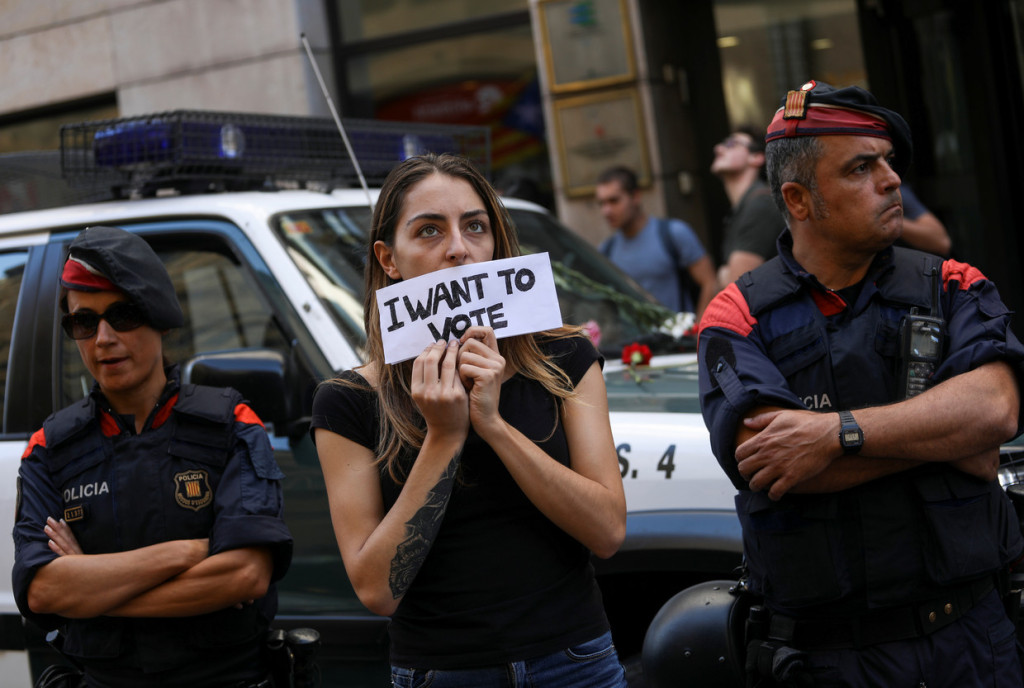What happens when the will of citizens goes against national law?
Spain is facing nowadays crucial issues for the national integrity. Approximately 40,000 people have taken to the streets in Barcelona after Guardia Civil, the oldest law enforcement agency in Spain, has arrested 14 people in the offices of the Catalan government, some of whom are senior officials, like Josep Maria Jové, secretary general of economic affairs.
This one has been the last move of the national government, which aims to stop the referendum for the independence of the autonomous community, scheduled for Oct. 1. Indeed, the Constitutional Court in Madrid claimed that the referendum project is illegal and opposed to the national sovereignty. The country’s 1978 constitution makes no provision for voting on self-determination. “Any illegalities require a response. Disobedience to the law is the opposite of democracy. There is no democratic state in the world that would accept what these people are trying to do. They’ve been warned and they know the referendum cannot take place.” These are the words used by Mariano Rajoy, Prime Minister of Spain.
Guardia Civil also broke into Catalunya’s government departments to confiscate approximately 10 millions of ballots and campaign materials for the referendum.
Catalan authorities responded immediately. Carles Puigdemont, President of the Generalitat of Catalonia, has called an emergency meeting, denouncing the “totalitarian attitude” of the national government. Oriol Junqueras, Vice President of Catalonia, commented: “They are attacking institutions of this country, and thus the citizens. We won’t allow it”.
The German Chancellor Angela Merkel supported the stability and integrity of the country rather then the independence challenge, and so did Jean Claude Juncker, President of European Commission, who pushed for respecting the decision of the Tribunal Constitucional.
The Spanish crisis is one of the many situations in today’s world that lets us think about the sovereignty and to whom it belongs. Literally, it belongs to the people who empower the government. So the question is: How could the people get the sovereign power back?
In this case, Catalans would like to vote to make their autonomous community free and independent, but the national authority cannot let them do it because they would take down the national integrity. Spain wouldn’t lose only one community but the victory of the independent movement could cause a massive ripple effect in the country. And not only Madrid cannot allow it, but also the European Union, which is still facing the problems caused by Brexit, another dramatic and unexpected split. Therefore does the will of Catalans have to perish in front of the national government decisions? If things go wrong, the latter shouldn’t underestimate the beginning of a revolution, which unconstitutionally aims to undermine the established order. Or at least, Madrid government shouldn’t underestimate also a civil war as a drastic solution.
However, this situation does not necessarily have to end in any of these dramatic ways. History has also known peaceful secessions, but the fact is that in our all-connected world splits of any kind seem to us as something extremely negative. But that is not always the case.
For instance, Czechoslovakia peacefully dissolved on January 1, 1993, and the independent states of the Czech Republic and Slovakia were born. It is known as the Velvet Divorce.
Although we cannot compare these new-born countries after the fall of communism with the Catalons’ demand for independence, we should bear in mind that splits are not necessarily something unmanageable or manageable only by force. If the national government in Spain doesn’t want to give independence to Catalunya, maybe the two governments can cut a deal so that Catalans would renounce the complete independence but they could get some special treatment anyway.
The will of the people does not necessarily have to be given up in light of national legislation. Catalunya and Madrid will hardly change their mind and back off. But they have to consider all the available possibilities and find a way out to solve the problem if they don’t want to start a civil war, which is not unthinkable in the very difficult situation that has arisen.



